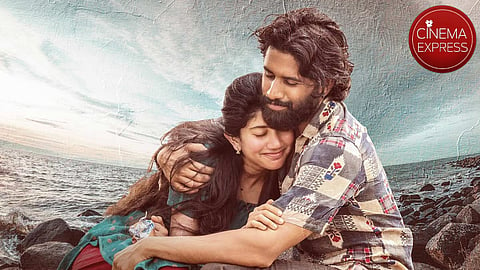Thandel Movie Review: Sai Pallavi-Naga Chaitanya's romance film runs into troubled waters
Thandel(2 / 5)
Thandel had so much potential to be a grand love story, a larger-than-life saga about two star-crossed lovers turning the world around to be together again. The opening credits of the film beautifully establish the protagonists as childhood sweethearts, capturing vignettes from their times growing up together. The first hour of the film has many sparkling moments where Raju (Naga Chaitanya) and Satya (Sai Pallavi) make the most of their moments when together and long to hear each other’s voices when apart from each other. But Thandel is also the kind of film that uses Middle-Eastern music in the background and equates it to a ‘Pakistani’ sound, the kind where the bad guy needs to assault a child and urinate on a country’s flag because they are from another religion. It’s this mishmash, in both content and tone, that Thandel suffers from the most.
Cast: Sai Pallavi, Naga Chaitanya, Babloo Prithiveeraj, Prakash Belawadi
Director: Chandoo Mondeti
After focusing on the love story in the first half, the film takes a drastic turn at the interval point as Raju and his friends, who are fishermen by profession, are found guilty of breaking international laws and are sent to Karachi jail. However, we rarely get a glimpse of the hardships these men face as prisoners. The first scene of Raju and others in a court hearing is rushed away with a voiceover, not letting us absorb the gravitas of the sentencing or their shock. With a haywire narration in terms of pacing, Chandoo Mondeti scurries from one jail scene to another, refusing to give us a sense of passing time between the sessions. Consequently, the strenuous time spent by these characters behind the bars never impacts us emotionally. In the name of their lives as fishermen, all we get is a couple of action scenes where Raju gets to be the suave saviour. Despite spending so much time with them in the second half, we know nothing of them as individual characters. Together, they are a block of ‘Indian fishermen’ and nothing more.
Even the way the central conflict kicks in feels disingenuous—these fishermen don’t enter international waters merely by accident; the misdirection occurs because Raju goes out of his way to save a stranger (who just happens to be a Pakistani). This is not the story of a wronged, ordinary fisherman but rather a wronged noble hero. The film wants you to know the difference, and this skewed treatment is what leads Thandel to falter at large. The second half veers into blatant jingoism, making room for scenes that add nothing to the plot. The minute the film incorporates Article 370 as a plot point, incorporating visuals where common Pakistani citizens, fuelled by Indian political policies about Kashmir, are staging riots, you know the makers are out of ideas.
While Sai Pallavi and Naga Chaitanya share great chemistry, the scripting of their love story leaves a lot to be desired. After witnessing a close one die, Satya gets increasingly anxious about the possibility of Raju spending nine months a year away from her for all life and gives him an ultimatum. How Raju handles the ultimatum and Satya responds to his decision, is embarrassingly half-baked and stops us from wholeheartedly rooting for our protagonists. For a love story, that’s a lethal flaw. Naga Chaitanya is underwhelming as Raju. Besides the physical transformation, there is little else about the performance that reaches out to you.
The gaping holes in his act become all the more apparent because of how impactful Sai Pallavi is, breathing life into every moment as Satya. Despite a shoddy character sketch, Sai lends great gravitas to her role, capturing a whole gamut of emotions Satya goes through. It won’t be an exaggeration to say that she is the sole saving grace of this film. While Devi Sri Prasad’s songs are memorable, the background score is rather generic, failing to elevate the proceedings.
What stays with you is the restrained pace in the first hour, the montage built around Satya as she sits by the seaside, melancholic, not knowing what the future holds in store for her. The little tick marks Satya makes on the calendar.
While Thandel is billed as a love story with a hint of survival drama, what takes us by surprise are the moments of struggle the lonely women back home put up with. As Satya does everything from confronting the exploitative vendor in Gujarat to fetch the fishermen’s due wages to standing outside a politician’s house in a bridal outfit to get her attention, one realises how these women are as brave and heroic as their male counterparts, if not more. At the hands of a more skilled filmmaker, this could have been a very moving film about how a political event affects personal lives on all quarters. Thandel, unfortunately, is not that film.

